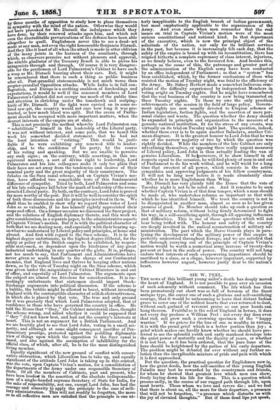SIR W. PEEL.
THE news of this brilliant young sailor's death has deeply moved the heart of England. It is not possible to pass over an occasion of such solemnity without comment. The life which has thus been prematurely cut short was so full of heroism of the finest antique type, the career one of such a glorious and self-sacrificing courage, that it would be unbecoming to leave that distant Indian grave to cover one of the noblest hearts that ever returned to dust, without such garland of reverent praise as our poor hands can hang thereon. Fruitful as is the soil of England in heroes, it does not every day produce a William Peel : not every day does even that rich soil grow such a crowning specimen of the "happy warrior." If we grieve for the loss of one so wealthy in virtues, it is with the proud grief which is a better portion than joy ; a grief which makes one hardly know whether we should have pre- ferred to see the splendid youth and early manhood develope into the quiet power of maturity and the dignity of years, or whether it is not best, as it has been ordered, that the pure fame of the hero should be heightened by the pathos of his early departure. The problem might be debated for ever without any further so- lution than the inexplicable mixture of pride and pain with which it is first approached.
But the question, the practical question for Englishmen now is, how the great deeds, how the self-sacrifice of this young English Paladin may best be rewarded by the countrymen and friends, for whom he showed that greatest love which men can show, freely laying down his life for them. This is a question which presses sadly, in the course of our rugged path through life, upon most hearts. Those whom we love and revere die ; and we feel that there is about us, all the more for their departure, a presence that will not be forgotten, " a presence which disturbs us with the joy of elevated thoughts." But if those dead lips yet speak,
is it not to summon us, with the solemn peremptoriness of the grave, to the closer fulfilment of every earthly duty in the sphere which we, each and all of us, occupy ? Our Neills, and Have- looks, and William Peels teach us more by their deaths than they could have done even by their lives. They are a rebuke to the cold fanaticism which, tied and bound by impracticable millen- nial theories, refuses to admire the imperishable beauty of their deeds. They are a still more bitter rebuke to the riotous and careless enthusiasm, which can but exult in the bravery of sol- diers, but does not strive to make it fruitful by that careful action in the civil departments of the State, without which all military heroism is but wasted treasure. And here we see the best reward for our great dead. Here we see what the brave hearts that are hid under that terrible Crimean plateau, and under Indian sands, may claim from us as their right. If it were possible for a William Peel to think of rewards for that which nothing earthly can adequately reward, if in his hour of agony. a Havelock could have been asked what shall England do to commemorate his gifts to her, they would doubtless have said, " Put us up no statues; forget our very names if need be ; only look carefully to what you do hereafter with those who hold their blood cheaper than water in the service of England. Let your party, your sectarian strifes, burn as fiercely as they must, only spare us that last and bitterest pang of knowing or fearing that, while we willingly die for you, we die in vain. We soldiers can but give our lives; do you give your lifelong thought, whether as sovereign, as legislators, as citizens, to keep that which we win, and to keep it as pure and undefiled, as serviceable for the cause of God and man, as human things may be."
Are we fulfilling this duty ? Is our civic life answering to the heroism which is developed by our military power ? Are we in all respects as nation and as individuals deserving the holocaust of great hearts which is being offered up freely for Rngland ? Grave questions ; questions which cannot be put by, in the sight of Havelock's neglected life, and Peel's early grave. If these ques- tions are treated with more of serious inquiry because of these sacrifices, even those to whom the dead were most dear, to whom their presence was as the daily bread and comfort of existence, will not wish them back again, or grudge their lives to the coun- try which shall have loved them so wisely and so well, and re- warded them as their noble spirits would alone care to be re- warded.



































 Previous page
Previous page